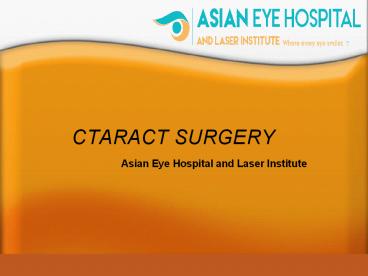Cataract surgery-Asian Eye Hospital - PowerPoint PPT Presentation
Title:
Cataract surgery-Asian Eye Hospital
Description:
Modern cataract or lens replacement surgery is one of most successful surgeries known. It is effective in restoring vision to most patients.Contact Asian Eye Hospital for cataract surgery – PowerPoint PPT presentation
Number of Views:300
Title: Cataract surgery-Asian Eye Hospital
1
CTARACT SURGERY
Asian Eye Hospital and Laser Institute
2
Cataract ( Motibindu )
- What is Cataract ( Motibindu ) ?
- A cataract is an opacity (or cloudiness) in the
lens of the eye. This restricts light passing
through the eye and reaching the retina. When
this occurs, vision is affected.
3
Common Symptoms of Cataracts
- Clouded, blurred or dim vision.
- Increasing difficulty with vision at night.
- Sensitivity to light and glare.
- Seeing "halos" around lights.
- Frequent changes in eyeglass or contact lens
prescription. - Fading or yellowing of colors.
- Double vision in a single eye.
4
Causes of Cataract
- The most common cause of cataracts is Aging.
- Inherited or developmental problems
- Health problems such as diabetes
- Medications such as steroids
- Trauma to the eye
5
Cataract ( Motibindu ) Surgery
- Modern cataract or lens replacement surgery is
one of most successful surgeries known. It is
effective in restoring vision to most patients. - The surgeon makes a tiny incision on the side of
the cornea, removes the eyes clouded natural
lens after dissolving it (using a procedure known
as Phacoemulsification) and then replaces it with
an artificial Intraocular Lens (IOL). - Modern cataract surgery is a safe outpatient
procedure that barely takes about 10 minutes.
6
Benefits Of Cataract Surgery
- Improved sight and color vision
- Improved clarity of vision
- Increased independence
- Improved quality of life
- Reduced dependence on corrective eyewear
7
FAQ About Cataract Surgery
- 1. How Is Cataract Detected?
- A cataract may be detected by your
optometrist or family doctor. It is important
that a thorough eye examination is performed by
your optometrist or eye specialist to ensure that
there are no other causes for your blurry vision. - 2. How Fast Does A Cataract Develop?
- How fast a cataract develops varies among
individuals and may even vary between eyes. In
younger people and people with diabetes cataracts
may progress rapidly over a few months. However,
most age-related cataracts progress gradually
over a period of years. - 3. When Should A Person With A Cataract Have
Surgery? - Cataract surgery is usually considered when
loss of vision begins to interfere with daily
activities or affect your quality of life. Based
on the specific symptoms, a patient and his/her
surgeon should decide together when surgery is
appropriate.
8
- 4. How Is A Cataract Treated?
- During the early stages of a cataract, a
change in glasses may improve the clarity of
vision, though this is usually temporary. When
cataracts begin to interfere with daily
activities, surgical removal is the only
effective treatment. - 5. Is Cataract Surgery Permanent?
- Yes. It is not possible to get another
cataract once it has been removed. However,
approximately 10 of patients may become aware of
a gradual blurring of vision some months or even
years after the surgery due to thickening of the
lens capsule that supports your artificial lens.
9
- 6. Will I Need Glasses After The Surgery?
- Most patients will require glasses for fine
visual tasks although some patients can get by
without them for certain activities.The design of
IOL decides your need for spectacles after the
surgery. Newer advanced IOL (Toric, Multifical
and Accomodative) can treat cataract and get rid
of spectacle power too. - 7. What If I Have Other Eye Diseases Will
Cataract Surgery Help? - There are many diseases which can affect and
limit the eyes visual improvement following
cataract surgery. These can be diagnosed before
the operation and your eye specialist will
discuss the impact of any such problems with you.
10
- 8. Does The Operation Hurt?
- No. An anaesthetic is applied before surgery
so that there is no pain, but some people
experience slight discomfort after the surgery.
The anaesthetic stops the eye from moving during
the operation and your eyelids are held open by a
spring, so all you have to do is lie still for
the surgery. You cannot see what is happening
during the operation. - 9. Can Problems Occur After Surgery?
- Cataract surgery is very safe and has a high
success rate. However it is important to
understand that complications can occur during or
after the surgery. If you experience even the
slightest problem after surgery, please contact
your surgeon immediately.
11
Contact Us
- Asian Eye Hospital and Lasik Laser Institute
- Address Sakar 10, 3rd floor, Above Fab
India, - Opposite Jehangir Hospital,
Station, road, Pune, - Maharashtra 411002
- Phone088889 42222
12
- Thank You!!!!!!































